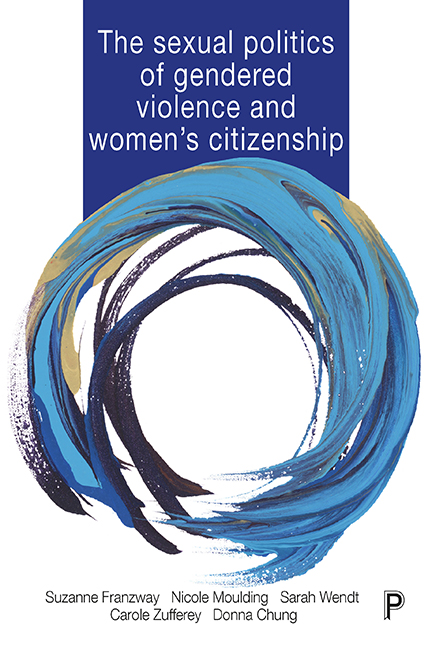Book contents
- Frontmatter
- Contents
- List of tables and figures
- Notes on authors
- Acknowledgements
- one The sexual politics of gendered violence and women’s citizenship
- two Problems of citizenship, violence and gender
- three Challenges of researching gendered violence
- four Living the connected effects of violence
- five Gendered violence and the self
- six Re-engaging lives
- seven Campaigns for women’s freedom from violence
- eight Transforming sexual politics
- References
- Index
six - Re-engaging lives
Published online by Cambridge University Press: 13 April 2022
- Frontmatter
- Contents
- List of tables and figures
- Notes on authors
- Acknowledgements
- one The sexual politics of gendered violence and women’s citizenship
- two Problems of citizenship, violence and gender
- three Challenges of researching gendered violence
- four Living the connected effects of violence
- five Gendered violence and the self
- six Re-engaging lives
- seven Campaigns for women’s freedom from violence
- eight Transforming sexual politics
- References
- Index
Summary
Introduction
In previous chapters, we have shown how the impact of intimate partner violence (IPV) on employment, housing and mental health limits women's capabilities to exercise citizenship in complex and interconnecting ways. It became increasingly clear as we analysed the data from the survey and interviews that the impact of IPV on women's social participation is particularly significant to citizenship. There has been no previous research into the impact of IPV on women's social participation. The analysis presented here therefore makes a new contribution to knowledge about how IPV interrupts and changes women's social relationships and affiliations in ways that have lasting effects on the capacity to exercise citizenship. In common with the findings in relation to employment, housing and mental health, our analysis shows that women do not regain the levels of social engagement they had prior to IPV, and that the nature of social participation is also changed by IPV in ways that are not wholly negative. In this chapter, we explore how IPV affects women's participatory citizenship and the interconnections with its impact on the three other key life domains. We also examine how women rebuild the social relationships and connections in their lives.
Social participation and citizenship
Social participation is often a focus in the health science literature as a key aspect of health and wellbeing. It is commonly understood to include undertaking an activity in preparation for connecting with others; being, interacting and doing an activity with others; helping others; and contributing to the neighbourhood and society (Levasseur et al., 2010). Research into social participation includes measures of both formal and informal activities in society. These can be activities such as church involvement, sports, hobbies such as book or arts groups, political activities such as union meetings, and socialising with friends and family (Lindström et al., 2001). We were therefore interested in the impact of IPV on women's involvement in common everyday social activities that build affiliation, enjoyment, confidence and a contribution to wider communities and societies.
- Type
- Chapter
- Information
- The Sexual Politics of Gendered Violence and Women's Citizenship , pp. 113 - 146Publisher: Bristol University PressPrint publication year: 2018

